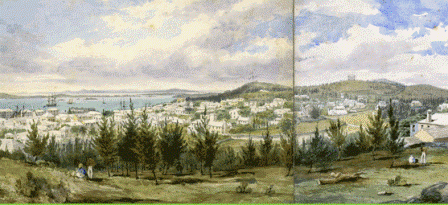NU researchers earn grant together to study climate, empire and timber trade

One of the goals of Nipissing University's Master of Environmental Studies/Master of Environmental Science program is to foster interdisciplinary research on the environment. Recently, Dr. Kirsten Greer, assistant professor of Geography and History, and Dr. Adam Csank, assistant professor of Geography, were awarded a $75,000 Insight Development grant from the Social Sciences and Humanities Research Council of Canada for their two-year project, Empire, Trees, and Climate in the North Atlantic: Towards Critical Dendro-Provenancing.
Greer, a historical geographer, and Csank, a dendrochronologist, have brought together scholars from geography, marine archaeology, and history to understand how the Atlantic “triangle” trade in timber can inform studies on climate.
In the early to mid-nineteenth century, British North America was an integral site in Britain’s trans-Atlantic trade of timber, fish, sugar, rum, and molasses with the West Indies. Known today as eastern Canada, the region’s forests and watersheds were transformed into the modern world system as the Crown secured lands and timber rights during the Napoleonic Wars. Considering that British North American timber was integral to ship-building, imperial infrastructure (dockyards, fortifications, government buildings), and maritime supremacy in the age of sail, the project's research team will integrate archival and museum research, dendro-provenancing (e.g. analysis of tree ring widths of historic buildings and shipwrecks), and visualizing techniques using GIS in order to uncover important insights into climatic conditions, and forest resource use, of the past.
Partnering with the National Museum of Bermuda, the Department of Conservation Services (Government of Bermuda), and the Bermuda National Trust, team members include: Kirby Calvert (Geography, Penn State University), Kimberly Monk (Archaeology & Anthropology, Bristol University), Andrew Smith (Management School, Liverpool University), and Margot Maddison-MacFadyen (Interdisciplinary Program, Memorial University).
